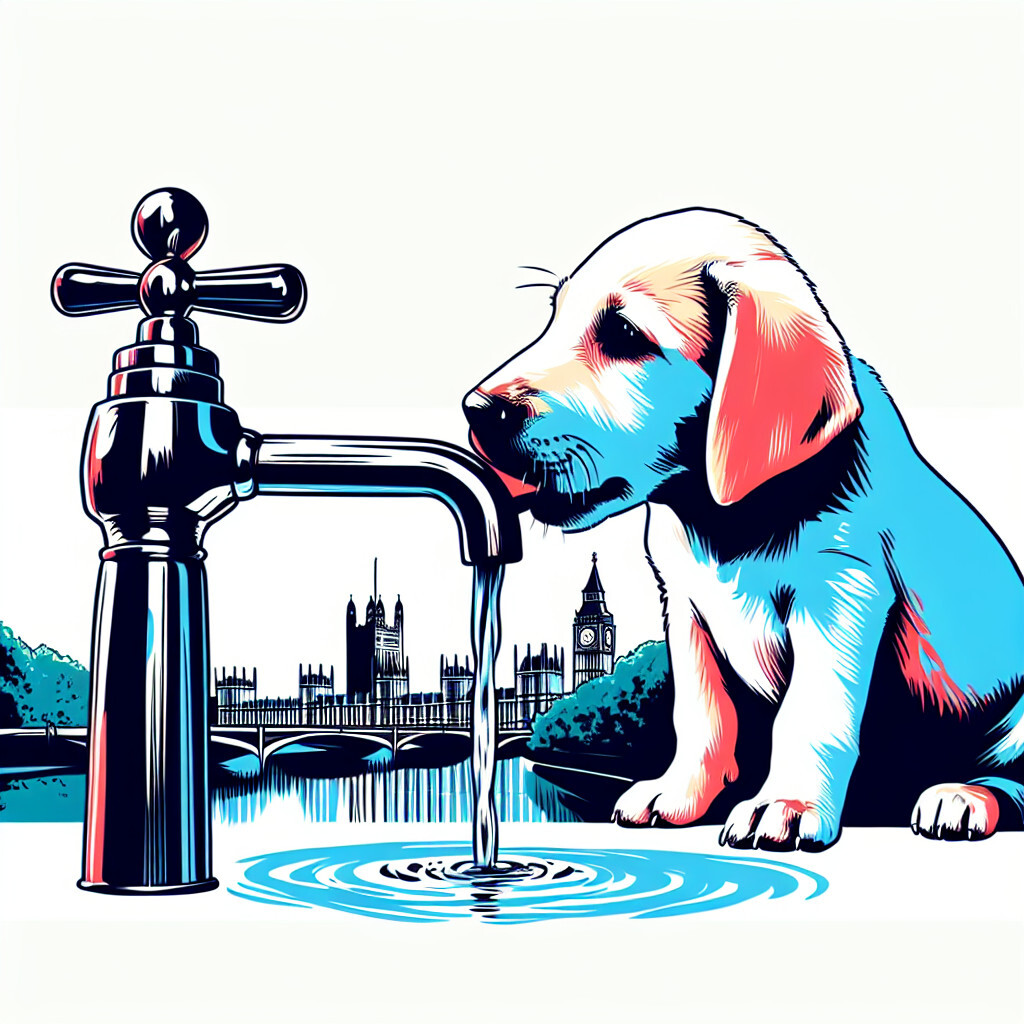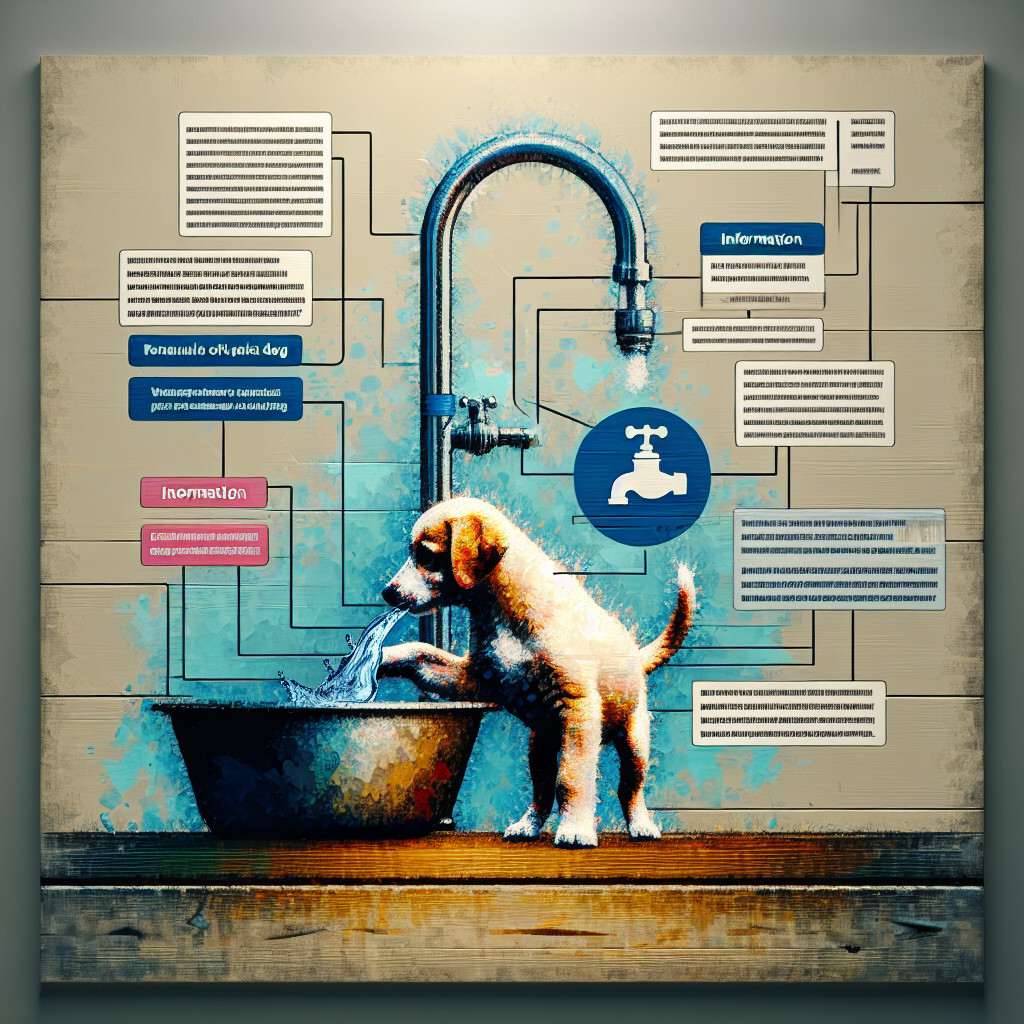-
Table of Contents
“UK Tap Water: A Safe Hydration Choice for Your Dogs”
Introduction

In the UK, tap water is generally considered safe for dogs to drink. The water undergoes rigorous treatment processes to remove harmful substances and bacteria, ensuring it meets strict safety standards. However, the safety can vary depending on the region and the quality of household plumbing. Some dogs may also be sensitive to the chlorine used in water treatment. Therefore, while tap water is typically safe for dogs in the UK, there may be exceptions based on specific circumstances.
Understanding the Safety of UK Tap Water for Dogs
Understanding the safety of UK tap water for dogs is a topic of interest for many pet owners. The question, “Is tap water safe for dogs in the UK?” is one that is frequently asked, and the answer is generally yes. However, there are certain factors to consider to ensure the health and wellbeing of your furry friend.
In the UK, tap water is regulated by strict standards set by the Drinking Water Inspectorate (DWI). These standards ensure that the water is safe for human consumption, and by extension, for most pets. The water is treated to remove harmful bacteria and other contaminants, making it generally safe for dogs to drink. However, it’s important to note that while the water is treated, it may still contain certain minerals and chemicals, such as chlorine, which some dogs may be sensitive to.
The quality of tap water can also vary depending on the region. For instance, in some areas, the water may be ‘hard’, meaning it has high levels of minerals like calcium and magnesium. While these minerals are not harmful to dogs in moderate amounts, excessive consumption can lead to health issues such as urinary problems. Therefore, if you live in an area with hard water, it may be worth considering a water softening system or providing bottled water for your dog.
Another factor to consider is the cleanliness of your dog’s water bowl. Even if the tap water is safe, bacteria can build up in the bowl if it’s not cleaned regularly. This can lead to gastrointestinal problems in dogs. Therefore, it’s crucial to clean your dog’s water bowl daily to ensure they’re not consuming harmful bacteria.
While tap water is generally safe for dogs in the UK, there are certain situations where it may not be. For example, if there’s a boil water advisory in your area due to a waterborne disease outbreak or contamination, it’s crucial to provide your dog with bottled water until the advisory is lifted. Similarly, if your dog has a specific health condition that makes them more susceptible to certain contaminants, it may be best to provide them with filtered or bottled water.
In conclusion, tap water in the UK is generally safe for dogs to drink. However, it’s important to consider factors such as the hardness of the water, the cleanliness of the water bowl, and any specific health conditions your dog may have. If you’re ever in doubt about the safety of the tap water for your dog, it’s always best to consult with a vet. They can provide guidance based on your dog’s specific needs and the water quality in your area.
Remember, water is essential for your dog’s health, so ensuring they have access to clean, safe water is a key part of responsible pet ownership. Whether you choose tap water, filtered water, or bottled water, the most important thing is that your dog stays hydrated with safe, clean water.
The Impact of UK Tap Water on Canine Health
In the United Kingdom, the question of whether tap water is safe for dogs is a topic of considerable interest for pet owners. The quality of tap water varies across the country, and while it is generally safe for human consumption, the impact on canine health is a subject that warrants further exploration.
The UK’s tap water is regulated by strict standards set by the Drinking Water Inspectorate (DWI), ensuring it is safe for human consumption. However, these standards do not necessarily translate to safety for dogs. Dogs have different physiological structures and metabolic rates compared to humans, which can make them more susceptible to certain contaminants that may be present in tap water.
One of the primary concerns is the presence of chlorine, a disinfectant used to kill harmful bacteria and other microorganisms in water. While chlorine is effective in ensuring the water is safe for humans, it can be harmful to dogs if ingested in large amounts. Dogs have a more sensitive sense of smell and taste than humans, and the presence of chlorine can make the water unpalatable to them. Moreover, excessive consumption of chlorinated water can lead to health issues such as stomach upset and changes in red blood cells.
Another potential issue is the presence of heavy metals such as lead and copper. These metals can leach into the water supply from old pipes and plumbing fixtures. While the levels of these metals in UK tap water are typically within safe limits for humans, they can be harmful to dogs if ingested over a long period. Chronic exposure to these metals can lead to health problems such as kidney damage and neurological disorders in dogs.
Fluoride, added to water supplies to improve dental health in humans, is another contentious issue. While small amounts of fluoride are not harmful to dogs, excessive consumption can lead to skeletal fluorosis, a condition that causes pain and damage to bones and joints.
Despite these potential risks, it is important to note that the majority of tap water in the UK is safe for dogs to drink. The levels of chlorine, heavy metals, and fluoride are generally low and within safe limits. However, if you live in an area with older plumbing or if you have concerns about the quality of your tap water, it may be worth investing in a water filter or providing bottled water for your dog.
In conclusion, while UK tap water is generally safe for dogs, there are potential risks associated with certain contaminants. As a responsible pet owner, it is important to be aware of these risks and take appropriate measures to ensure the health and wellbeing of your dog. Regular veterinary check-ups can help monitor your dog’s health and detect any potential issues early. If you have any concerns about the quality of your tap water, consult with a veterinarian or a water quality expert. After all, ensuring the safety and health of our beloved pets is of paramount importance.
Is Tap Water in the UK Safe for Your Dog’s Consumption?
In the United Kingdom, the question of whether tap water is safe for dogs to drink is a topic of concern for many pet owners. The safety of tap water for human consumption is strictly regulated by the government, but does this guarantee that it is also safe for our canine companions? The answer is not as straightforward as one might think, and it requires a deeper understanding of the quality of tap water and the specific needs of dogs.
The UK is renowned for its high-quality tap water, which is subject to rigorous testing and stringent standards set by the Drinking Water Inspectorate (DWI). The DWI ensures that the water supply is free from harmful bacteria, viruses, and chemicals that could pose a risk to human health. However, while these standards are designed with human health in mind, they do not necessarily account for the unique physiological needs and sensitivities of dogs.
Dogs, like humans, require clean, fresh water for optimal health. Water aids in digestion, nutrient absorption, temperature regulation, and overall hydration. However, dogs can be more sensitive to certain substances that may be present in tap water. For instance, high levels of chlorine, which is commonly used to disinfect tap water, can cause gastrointestinal upset in dogs. Similarly, the presence of heavy metals, such as lead or copper, can be harmful to dogs, even if they are present at levels deemed safe for humans.
Furthermore, the quality of tap water can vary significantly across different regions of the UK. Factors such as the local water source, treatment processes, and the condition of the water infrastructure can all influence the composition of tap water. For example, in areas with older plumbing systems, there may be a higher risk of contamination from lead pipes. Therefore, it is advisable for dog owners to be aware of the quality of their local tap water and to consider having it tested if they have any concerns.
Despite these potential issues, it is important to note that the vast majority of tap water in the UK is perfectly safe for dogs to drink. Many dogs drink tap water every day without experiencing any adverse effects. However, if you notice any changes in your dog’s behaviour or health after drinking tap water, such as vomiting, diarrhoea, or lethargy, it is important to seek veterinary advice.
In conclusion, while tap water in the UK is generally safe for dogs, it is not without potential risks. The best approach for pet owners is to be informed about the quality of their local tap water and to monitor their dog’s health closely. Providing fresh, clean water for your dog is an essential part of responsible pet ownership, and it is a simple step that can significantly contribute to your dog’s overall health and wellbeing. Whether this water comes from the tap, a filtered source, or bottled water, the most important thing is that it is safe and suitable for your dog’s consumption.
Exploring the Risks and Benefits of UK Tap Water for Dogs
In the United Kingdom, the question of whether tap water is safe for dogs is a topic of considerable interest for pet owners. The answer, however, is not as straightforward as one might hope. While tap water in the UK is generally safe for human consumption, the same cannot be categorically stated for our canine companions. This article aims to explore the risks and benefits of UK tap water for dogs, providing a balanced perspective for pet owners.
To begin with, it is important to note that the quality of tap water in the UK is regulated by strict standards. The Drinking Water Inspectorate (DWI) ensures that water companies supply water that is safe to drink and free from harmful substances. This means that, in most cases, tap water is unlikely to pose a significant health risk to dogs. However, there are certain factors that can affect the safety of tap water for dogs.
One such factor is the presence of heavy metals in tap water. While the levels of heavy metals in UK tap water are typically low, they can still pose a risk to dogs if consumed in large quantities over a long period. Heavy metals such as lead and copper can cause a range of health problems in dogs, including kidney damage and neurological disorders. Therefore, it is advisable for pet owners to use a water filter or provide bottled water if they are concerned about heavy metal contamination.
Another potential risk associated with tap water is the presence of chlorine. Chlorine is commonly used to disinfect tap water and kill harmful bacteria. While it is generally safe for dogs in small amounts, some dogs may be sensitive to it and experience gastrointestinal upset. Moreover, the smell of chlorine can deter some dogs from drinking enough water, leading to dehydration.
On the other hand, tap water also has several benefits for dogs. Firstly, it is readily available and cost-effective, making it a convenient option for pet owners. Secondly, tap water contains essential minerals such as calcium and magnesium, which are beneficial for a dog’s health. These minerals support various bodily functions, including bone health and nerve function.
Furthermore, tap water can also contribute to a dog’s dental health. Some studies suggest that the fluoride found in tap water can help to prevent tooth decay in dogs, just as it does in humans. However, it is worth noting that excessive fluoride can be harmful to dogs, so it is important to ensure that they are not consuming too much.
In conclusion, while tap water in the UK is generally safe for dogs, there are certain risks that pet owners should be aware of. Heavy metals and chlorine can pose potential health risks, but these can be mitigated with the use of a water filter or by providing bottled water. On the other hand, tap water also offers several benefits, including the provision of essential minerals and potential dental health benefits. Therefore, the decision to give tap water to dogs should be made on a case-by-case basis, taking into account the specific circumstances and health needs of each dog.
Q&A
1. Question: Is tap water safe for dogs to drink in the UK?
Answer: Yes, tap water in the UK is generally safe for dogs to drink.
2. Question: Can tap water in the UK cause any health issues in dogs?
Answer: Generally, tap water in the UK is treated and safe for dogs. However, if the water is contaminated, it could potentially cause health issues.
3. Question: Should I give my dog bottled water instead of tap water in the UK?
Answer: It’s not necessary to give your dog bottled water instead of tap water in the UK, as the tap water is usually safe. However, if you have concerns about your local water quality, you might choose to do so.
4. Question: Are there any specific areas in the UK where tap water might not be safe for dogs?
Answer: The quality of tap water can vary in different areas, but generally, the UK has high standards for water quality. If you have specific concerns, it’s best to check with your local water provider.
Conclusion
In conclusion, tap water in the UK is generally safe for dogs to drink as it is strictly regulated and tested for harmful substances. However, if there are concerns about specific contaminants in local tap water, using filtered water or bottled water may be a safer option.






